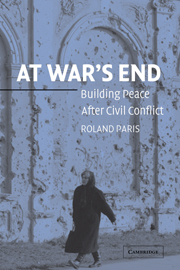Crossref Citations
This Book has been
cited by the following publications. This list is generated based on data provided by Crossref.
Jarstad, Anna K.
and
Sisk, Timothy D.
2001.
From War to Democracy.
Finnemore, Martha
2001.
Moral Limit and Possibility in World Politics.
p.
197.
Richmond, Oliver
2005.
Peace and Development: Strange Bedfellows?.
International Studies Review,
Vol. 7,
Issue. 3,
p.
437.
Samuels, Kirsti
2005.
Sustainability and peace building: a key challenge.
Development in Practice,
Vol. 15,
Issue. 6,
p.
728.
Avant, Deborah D.
2005.
The Market for Force.
Rocha Menocal, Alina
and
Kilpatrick, Kate
2005.
Towards more effective peace building: a conversation with Roland Paris.
Development in Practice,
Vol. 15,
Issue. 6,
p.
767.
Menocal, Alina Rocha
2005.
Editorial.
Development in Practice,
Vol. 15,
Issue. 6,
p.
725.
Dahlman, Carl
and
Tuathail, Gearóid Ó
2005.
Broken Bosnia: The Localized Geopolitics of Displacement and Return in Two Bosnian Places.
Annals of the Association of American Geographers,
Vol. 95,
Issue. 3,
p.
644.
Licklider, Roy
2005.
Peasants, Choice, and Civil Wars.
International Studies Review,
Vol. 7,
Issue. 2,
p.
311.
Tschirgi, Necla
2005.
Peacebuilding through Global Peace and Justice.
Development,
Vol. 48,
Issue. 3,
p.
50.
Schwarz, Rolf
2005.
Post-Conflict Peacebuilding: The Challenges of Security, Welfare and Representation.
Security Dialogue,
Vol. 36,
Issue. 4,
p.
429.
Russett, Bruce
2005.
Bushwhacking the Democratic Peace.
International Studies Perspectives,
Vol. 6,
Issue. 4,
p.
395.
PARIS, ROLAND
2006.
Bringing the Leviathan Back In: Classical Versus Contemporary Studies of the Liberal Peace.
International Studies Review,
Vol. 8,
Issue. 3,
p.
425.
Turner, Mandy
and
Pugh, Michael
2006.
Towards a new agenda for transforming war economies.
Conflict, Security & Development,
Vol. 6,
Issue. 3,
p.
471.
Suhrke, Astri
and
Buckmaster, Julia
2006.
Aid, growth and peace: a comparative analysis.
Conflict, Security & Development,
Vol. 6,
Issue. 3,
p.
337.
Richmond, Oliver P.
2006.
The problem of peace: understanding the ‘liberal peace’.
Conflict, Security & Development,
Vol. 6,
Issue. 3,
p.
291.
Elden, Stuart
2006.
Spaces of humanitarian exception.
Geografiska Annaler: Series B, Human Geography,
Vol. 88,
Issue. 4,
p.
477.
Rangwala, Glen
2006.
Critical Commentary: The Assumptions of Democracy.
Cambridge Review of International Affairs,
Vol. 19,
Issue. 2,
p.
299.
Weller, Marc
and
Wolff, Stefan
2006.
Bosnia and Herzegovina ten years after Dayton: Lessons for internationalized state building.
Ethnopolitics,
Vol. 5,
Issue. 1,
p.
1.
Barbara, Julien
2006.
Nation building and the role of the private sector as a political peace-builder.
Conflict, Security & Development,
Vol. 6,
Issue. 4,
p.
581.



